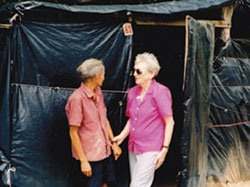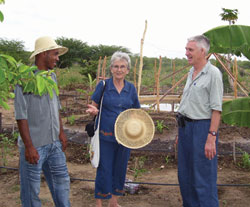No tears but mine
After years of negotiation, landless farmers are denied their dreams
By Clarice Garvey, O.L.M.
May/June 2008
Return to Table of Contents
Print Article
Most of my work with the landless people here in Brazil is life-giving and rewarding. I feel at home with them, enjoy their humour, and know that I am privileged to be called to share my life with them. But there are also times when I sense their frustration, sadness, and pain. With hardly a word of explanation their hopes and dreams are ignored, their rights are denied. I often wonder how they cope.
 Sr. Clarice Garvey with a member of a community of landless families who had been camped on the roadside while awaiting the government's decision on their request for ownership of land through the Agrarian Reform Program.
Sr. Clarice Garvey with a member of a community of landless families who had been camped on the roadside while awaiting the government's decision on their request for ownership of land through the Agrarian Reform Program.
You may recall my stories about a group known as the Uruanan. They had been living as a community in makeshift homes on a roadside, holding endless meetings among themselves as well as with government agents in their quest for land. After two years of these patient, nonviolent efforts, they were informed that all negotiations with the landowner had ceased. They would not now and likely not ever live on that land as they had dreamed.
In my disappointment, confusion and sadness I was confronted with several questions: How do these people survive, having been ignored, deceived and denied their rights – God given rights, legal rights, rights guaranteed by the very people who had just said no. How do they feel about a government elected mainly by the poor on the promise of land reform and who fail to deliver on that promise? How can they continue to believe that God hears the cry of the poor?
I have just returned from spending a few days with these very people. Initially, I hesitated to go so soon after their move off the land that they had occupied for two years. I was nervous. How would I greet them in this new place? Strangely enough they were waiting for me. To my surprise, there were no tears, except mine. Hug after hug, the greetings were the same: smiles and praise for the beauty of the new location.
We gathered in a circle, sitting on huge logs cut from dead trees in the bush. The people began to tell me their story, one picking up words left out by another. They said that when the government agents brought them the final word, they gathered together as they were accustomed to doing when faced with a crisis. And they did what they always do-they prayed. As they talked among themselves, they remembered that they had been deceived before and survived. They asked each other what they were to do now and discussed opinions long into the night.
 Martins Camurcan, an organic farmer, Sr. Clarice Garvey, and Bob Thomas of SHARE, a Canadian organization helping organic food growers in several countries. Brazil.
Martins Camurcan, an organic farmer, Sr. Clarice Garvey, and Bob Thomas of SHARE, a Canadian organization helping organic food growers in several countries. Brazil.
In the morning they decided to break into three groups. They would each find an area of land nearby where they could camp temporarily. They would continue to maintain their name as the Uruanan People. They would also maintain their dream.
They recalled their mission – to struggle, to free the land from large landowners who do not need it and who hold on to it only to increase their personal wealth and power. They committed themselves to continue, all three groups together as one community, so as to provide the support they needed from each other. They would keep in contact with the government agents, urging them to search out other lands in the region for the community's use and for the use of hundreds of other landless families in need of the basics for life.
They asked me to continue to visit them, to remind others to visit, and to spread their story. I was overwhelmed by their faith and courage. There was disappointment but no bitterness, no anger.
Later that night, under a beautiful sky full of stars and moon, we sat around a huge fire fed by dead branches of the caju (cashew) trees. We sang many of the old base Christian community songs about the importance of unity, about the joy that will be theirs one day, about hope and love, and about God's option for the poor, which had nourished their faith in the past.
Looking back now and reflecting on that experience, I can articulate some of what I learned with them. They have no doubt that they are loved by God, that God is in their lives and in their struggle. They believe that God hears them because it is God's presence that gives them the strength to continue. They know that they are blessed by God and want to share that blessing with others.
"Blest are the poor for the kingdom of God is theirs." Blessed are we who have the faith to believe these words of Jesus.
Return to Table of Contents
Print Article